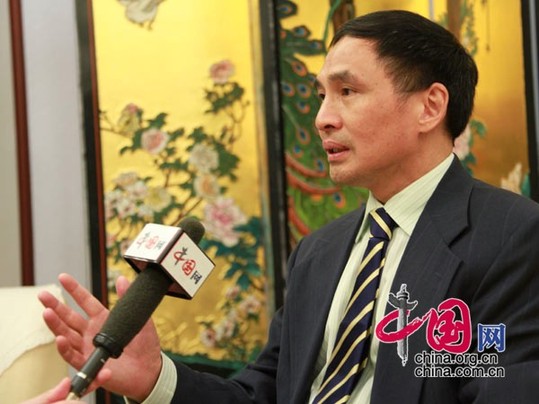US Asia-Pacific strategy destabilizes region
- By Zheng Yongnian
 0 Comment(s)
0 Comment(s) Print
Print E-mail China.org.cn, September 29, 2012
E-mail China.org.cn, September 29, 2012
The United States claims that its high-profile "pivot to Asia" strategy aims to "deter" the threat from a rising China in order to maintain the existing order in Asia. But the effects of this strategy seem to prove just the opposite.
|
|
|
Zheng Yongnian [By Hu Di/China.org.cn] |
Is Asia now more stable than it was before the U.S.'s adoption of this Asia-Pacific strategy? Obviously not. China and the U.S. had been living on relatively good terms before. But dramatic changes have happened in Asia due to America's new policy.
Before this new policy, China and other Asian nations had been constantly adjusting themselves to cater to the needs of others. Most Asian countries, ASEAN nations in particular, adopted a pragmatic foreign policy. They regarded China's economic growth as an opportunity and accordingly adjusted their relations with China. Meanwhile, China prioritized its economic and trade relations with other Asian countries, and accordingly kept a low profile on political and strategic issues and recognized the leading role of ASEAN. It was because of this mutual effort that the relationship between ASEAN nations and China had rapidly progressed, and the bilateral relations between China and other Asian countries became gradually institutionalized through various regional, international, bilateral and multilateral channels.
Some Western scholars have already realized the fact that during the past three decades, Asia maintained peace despite China's rapid growth, seemingly disproving the "tragedy of great power politics" in which an emerging power will eventually challenge the existing great power. Peace in Asia, to a large extent, was a result of rational choices and mutual adjustment of Asian countries including China. China placed its strategic priorities on economy and trade instead of the military.
The so called "threat" that the U.S. faces in Asia ― fears that China will eventually push it out of Asia ― is therefore more cognitive than real. Where do these fears come from? There are many contributing factors, including the so-called "security dilemma" caused by structural anarchy in international relations, differences in political ideology, and a lack of mutual trust.
How does the U.S. "pivot to Asia" affect regional geopolitics? Here we have to take into consideration the relationships between China and the U.S., China and other Asian countries, and the U.S. and other Asian countries.
First of all, the U.S. Asia strategy has changed and even interrupted the process of mutual adaptation of China and other Asian countries. Although the Obama administration has only voiced the strategy in its political rhetoric, the shift is enough to amplify Asian countries' expectations for U.S. support. Thinking that the U.S. will invest huge resources to confront China as it did against the Soviet Union during the Cold War, these countries, especially the ones which have maritime boundary disputes with China, have chosen to side with the U.S. Although China's response to the U.S. strategy has been largely defensive, it is still enough to prevent its relations with these countries from developing further.
Secondly, the U.S. pivot has shifted the priority in Asia from economic policy to strategic policy. This has occurred, in part, due to U.S. perception of its own strengths. After the onset of the financial crisis, U.S. economic dominance weakened, but its military remains the most powerful in the world. During the Cold War period, economic and military presence had the same weight in the U.S.'s foreign policy. But with its pivot, the U.S. is re-introducing strategic competition into Asia. This change has forced China to begin to move its focus from the economy to military strategy.
After years of joint efforts, China and the U.S. have actually built up very close bilateral relations, particularly in economic cooperation, trade and finance. As a result, some American scholars created a term "ChinAmerica" to describe the interactions and interdependency of China and the United States. But the U.S.'s re-introduction of strategic competition has changed this relationship. History has shown that economic competition is mostly benign, but strategic confrontation can and has lead to military conflict. When the two countries fall into such confrontation, they will inevitably assume the roles of the two ancient Greek city-states of Athens and Sparta, or the U.S. and the Soviet Union during the Cold War.
The U.S. bases its "pivot to Asia" on its cognition of "national interest". Likewise, it is also difficult for China to change its cognition of national interest. However, this does not mean that China-U.S. military confrontation is unavoidable. If U.S. wants to counterbalance China in Asia by pivoting back to the region, China must find means to counterbalance the U.S. Such means are the guarantee of peace.
The author is director of the East Asian Institute of the National University of Singapore.
(This article was translated from Chinese by Chen Qiuping.)
Opinion articles reflect the views of their authors, not necessarily those of China.org.cn.







Go to Forum >>0 Comment(s)